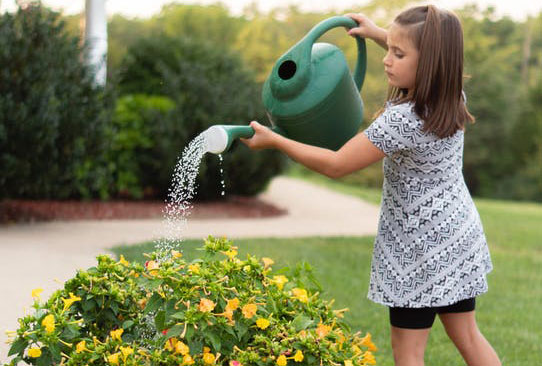Yard Waste Tips
Contribute to the zero waste cycle by reusing your biodegradable yard waste for nutrients and watch nature take action!
- Recycle or compost leaves, grass clippings and other yard waste, instead of blowing, sweeping, or hosing them into the street or gutter.
- Improve your soil by adding shredded leaves. The leaves will help feed earthworms and beneficial microbes.
- Make leaf mold by raking shredded leaves into a big pile and keeping the leaves moist. The leaves will disintegrate into a soil conditioner that increases water retention.
- Leaves work well as a protective mulch. Leaf mulch keeps soil cooler in the summer and warmer in the winter, suppresses weed growth, improves soil fertility, and reduces erosion. When using leaves as mulch, make sure to chop or shred them beforehand.
- Try grasscycling, leaving grass clippings as a natural fertilizer.
- Bonus Tip: Because grass is mostly water, it also provides moisture to your lawn, conserving water.

Water Conservation Tips – Be Water Wise
Water conservation is crucial to help prepare our community for future droughts and effects of climate change. Whether it’s falling from the sky or coming through our pipes, water is a precious resource that we all must help conserve.
- Irrigation timers: New sprinkler technology includes timers that read real-time conditions and deliver just enough water to keep your plants healthy.
- Sunrise/sunset watering: Water your lawn early in the morning or in the late afternoon when evaporation from the sun is low and the water has time to soak into the soil.
- Watch for rain: When rain is forecast, turn off automatic sprinkler systems or install a rain sensor, which will switch them off for you.
- Reuse and recycle: Capture water from the shower and sink and use it to water plants in the house and out in the garden.
- Install a water catchment system: These systems collect water which can be used to water lawns and gardens.
- Go native: Choose Northern California native plants for your garden. These low-maintenance, drought-tolerant varietals will save water and also require less pesticides, herbicides, and fertilizers. To find a list of drought tolerant plants for the Northern California area, click here.
Prevent Pesticide Runoff – Landscaping and Irrigation Tips
Proper design and management of the landscaping around our homes can help prevent pesticide runoff into local waterways. Some ways to reduce your landscaping irrigation needs and keep irrigation water onsite can be found here and here. Discover county-specific tips by using the UC Seasonal Landscape IPM Checklist.
To minimize pesticide runoff, follow these recommendations for pesticide-smart landscape design:
Help water soak into the ground.
- Use stones, pavers, gravel, mulch, or other materials that allow water to soak into the ground in areas where you don’t have plants.
- Aerate your soil and use organic material, like compost, as well as perforated drainage lines, to reduce areas of water pooling in your landscaping.
Create landscape features to collect runoff water.
- Consider using trees, rain gardens, terrace walls, rain barrels, or swales (long, shallow, grassy depressions) to hold water within the landscaped area and allow it to soak into the ground rather than draining directly to our surface waterbodies.
- Consider using river-friendly gardening approaches such as selecting appropriate plants, minimizing the use of chemical pesticides, and creating “hydrozones” by grouping plants according to water needs. Learn more about how to make your yard river-friendly on the Lodi Watershed Friendly Landscaping website or by following these River-Friendly Landscape Guidelines.
Learn More
- Be Water Wise is a treasure trove of resources on water-friendly gardening.
- The UC Master Gardeners will teach you how to garden organically or will help you find substitutes for chemical pesticides. The California Garden Web also includes drought irrigation tips.
- UC Davis Agriculture and Natural Resources provides a Lawn Watering Guide.
- Save Our Water has tips for making your landscape drought-tolerant.
- California Department of Water Resources provides a guidance on water-efficient landscaping.
- USEPA also provides guidance on water-smart landscape design.

Water Restrictions
In response to mandates from the State Water Resources Control Board and Executive Orders from the Governor, the City of Lincoln adopted the following water restrictions.
- The use of potable water in a fountain or other decorative water feature is prohibited unless the water is part of a recirculating system.
- The application of any potable water to outdoor landscaping during and up to 48 hours after measurable rainfall is prohibited.
- Hotel and motel operators shall provide guests with the option of not having towels or linens laundered daily and shall display a notice in each bathroom so notifying the guests of this option.
- Restaurants shall only provide drinking water to guests upon request.
- The application of potable water on driveways, patios, sidewalks, and other surfaces is prohibited unless it is to address an existing health and safety issue.
- The application of potable water to outdoor landscapes in a manner that causes substantial runoff onto adjacent property, non-irrigated areas, private and public walkways, roadways, parking lots or structures is prohibited.
- The application of any potable water to median ornamental turf in any street medians, whether public or private, is prohibited.
- Covers shall be required for all newly constructed pools and spas.
- All leaks shall be repaired within five days or sooner if required by the City.
- When in use, hoses shall be fitted with a positive pressure manually operated hose nozzle.
For frequently asked questions about Lincoln water restrictions, click here. Noncompliance with the stated restrictions may be enforced by penalty per Municipal Code Chapter 13.04, Article IX Relating to Water Conservation and Penalties. If you have any questions regarding the water restrictions, please email Public Services at Public.Services@LincolnCA.gov or call 916-434-2450. To report any water waste, call the Water Hotline at (916) 434-2455.
SHARE YOUR WATER-WISE ACTIONS!
Small actions in our yards can make a large impact in Lincoln! Not only can conserving water save money and help prevent pollution, it can also have long-lasting effects and add to the beauty of your space. Such actions include adding native plants, using smart irrigation timing practices or rain sensors, and installing water catchment systems to collect rainwater for use on your lawn and garden.
Have you done any or a combination of these practices? We’d love to hear about it! Please complete our “Lincoln’s Water-Wise Actions” form for a chance to have your water project featured, which can inspire your neighbors to also make a positive impact. By doing so, you’re helping to create a sense of collective action that can support Lincoln’s future!

